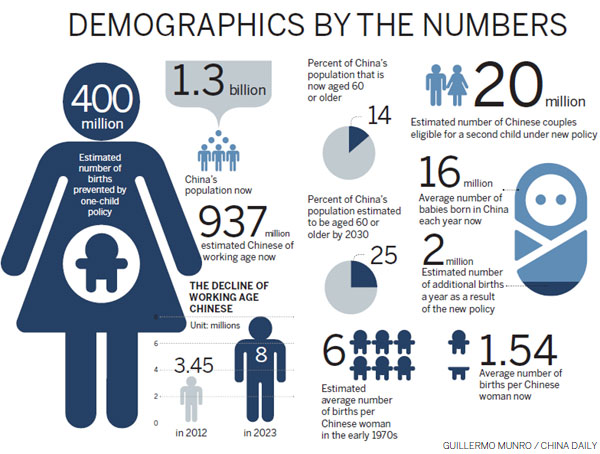Another one on the way

"Children (in China) are expensive not in that parents cannot feed them or clothe them, they are expensive in the sense that parents are uncertain about the future of their children and so they enter into a highly competitive educational process because they worry about the skills they may not have for a good job and a good life."
The other factor Wang believes will stunt the number of additional births is a now entrenched lifestyle that many Chinese will not want to give up. Urban Chinese women are career driven and marrying later, he says.
"Chinese women have among the highest labor force participation rate in the world.
"Young people are increasingly choosing a different lifestyle. The proportion of young women who choose not to get married has gone up substantially in the last 10 years. We are looking at an increase from less than 10 percent (who do not marry) to over 20 percent (who do not marry) in women aged 25-29."
Wang says 37 percent of China's population, mostly in rural areas, has always been exempt - or able to apply for exemptions - from the one-child policy.
"Most have a second child," he says.
It is the urban-dwelling, modern Chinese woman who will need to have more children if the plummeting birthrate is to be meaningfully addressed.
The current data are not encouraging.
"More than 50 percent of the population now lives in urban areas," Wang says. "The (latest) census reported the average number of children born in cities as 0.7 percent; not even one child (per woman)."
This result, he says, came even though some urban couples had already been granted an exemption to have a second child, if they were both themselves only children.
"Surprisingly the majority of these people only end up with only one child, and that is a concern for China right now," Wang says.
Sophie Li, 26, an operations and marketing manager who lives in Beijing, is a flag bearer for the modern, urban Chinese woman. Nine months pregnant, she and her husband, who works for a state-owned enterprise, have decided they will have a second child.
She has a live-in ayi, or maid, who helps with the housework and will act as a nanny when the baby arrives. She has already made arrangements to return to work three days a week after the birth.
She says her mother, whom she helps support financially, will also play a role in helping raise the children. Access to cheap childcare and a culture of parental support are important aspects that Western commentators have not factored in when suggesting women with two children will not return to work, demographer Li Jianmin says.
Chang Kai, an economist and head of the School of Labor and Human Resources at Renmin University of China, says many Chinese could decide bearing the cost of two children now is a worthwhile investment for later life.
"We have to consider the relationship between inputs and outputs," he says. "If parents pay more now to have two children, in the future they will have two children to care of them when they're elderly."

Back in Zhoushan, Le and Zhou are coy about discussing their finances and about whether both will continue working full time as real estate agents after their second child is born.
Slightly embarrassed at the attention, the expectant parents seem bemused by the thought that their baby may be the first of something new, among all of China's 1.3 billion people.
"We haven't really thought about it," Zhou says, adding that when it comes to numbers and people, there is only one simple equation that matters to her.
"We wanted to have a second because we love children, and I think one is not enough."
Contact the writers through josephcatanzaro@chinadaily.com.cn

(China Daily Africa Weekly 02/14/2014 page1)
Today's Top News
- Nation's euro bond sale shows investors' confidence
- No soft landing for Tokyo's hard line
- Commerce minister urges US to increase areas of cooperation
- Strong demand for China's sovereign bonds signals global confidence
- Ministry urges Japan to 'maintain self-respect'
- Forge closer ties with Zambia, says Li






























